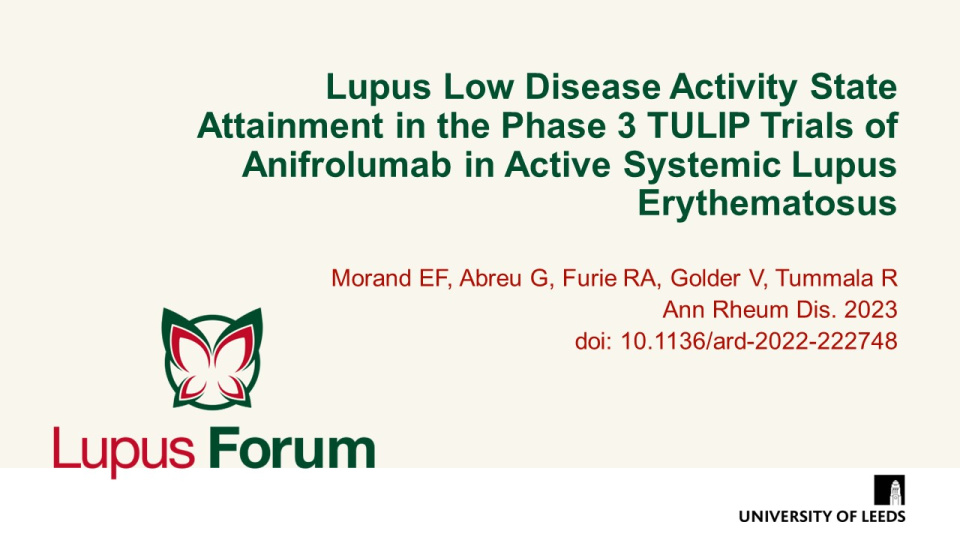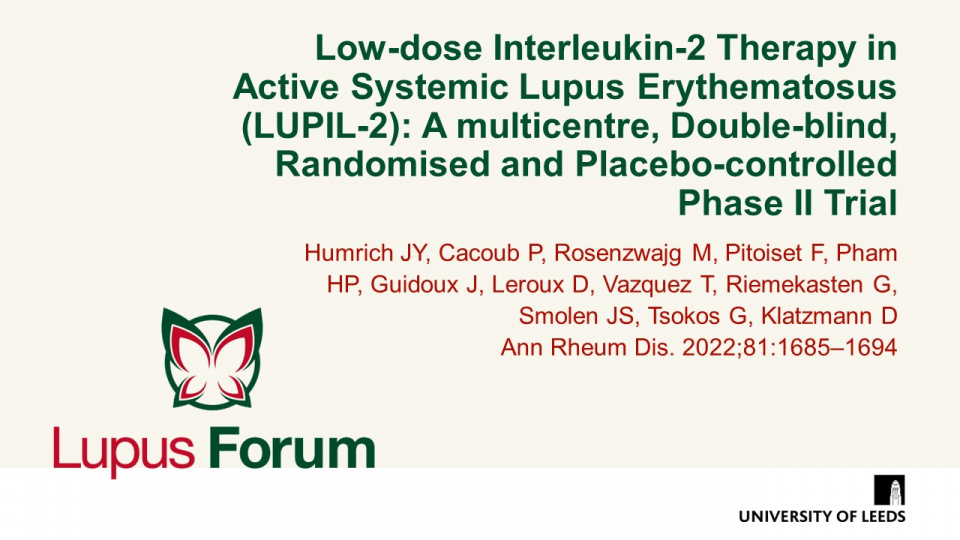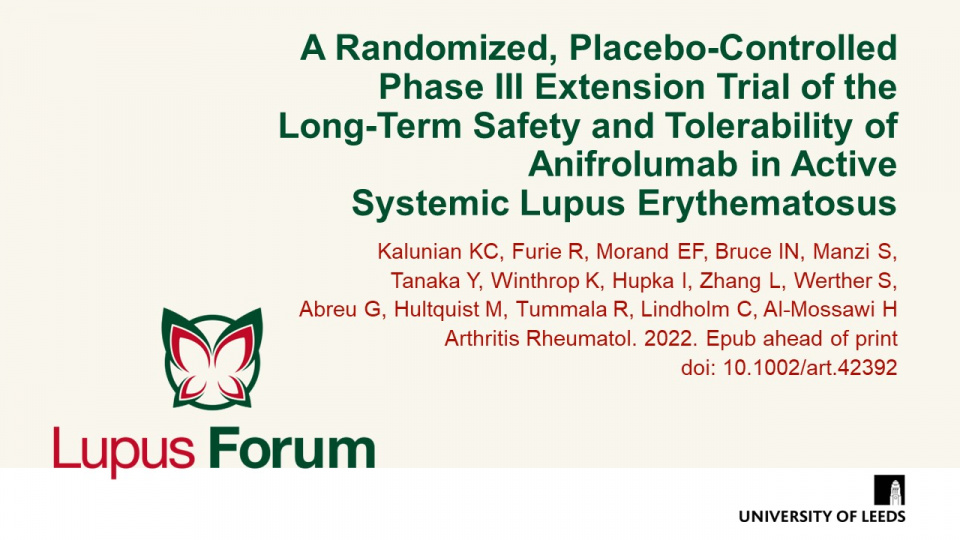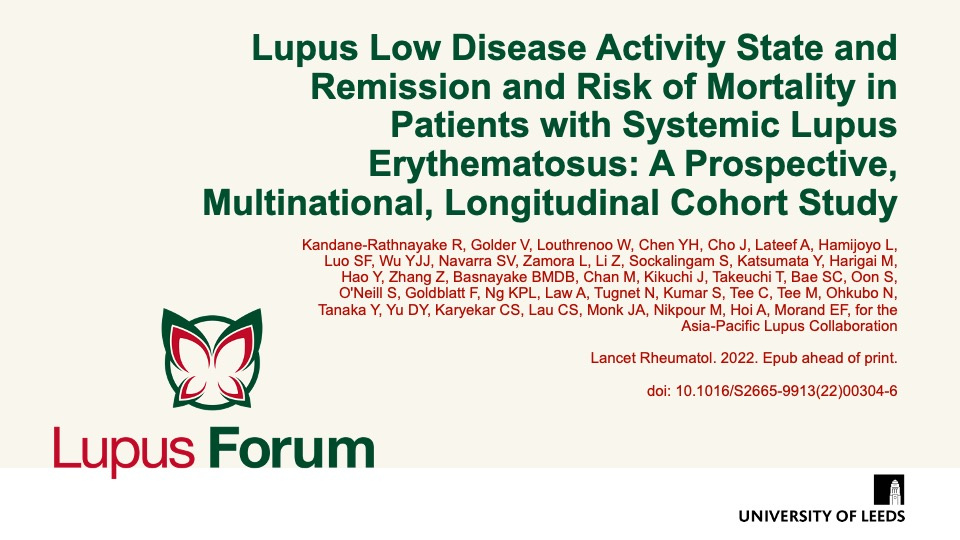Publications
Find coverage of the latest original articles on Lupus, focusing on those with data on therapeutic interventions and those that have clinical impact.
Lupus Low Disease Activity State Attainment in the Phase 3 TULIP Trials of Anifrolumab in Active Systemic Lupus Erythematosus
Ann Rheum Dis. 2023. doi: 10.1136/ard-2022-222748
Post-hoc anaylsis of TULIP trials shows that, compared with placebo, anifrolumab treatment was associated with earlier, more frequent, and more prolonged and sustained lupus low disease activity state (LLDAS).
Relationship Between the EULAR/ACR Classification Criteria and Organ Damage in Systemic Lupus Erythematosus
Lupus. 2023. doi: 10.1177/09612033231153791
Ambispective cohort study concludes that, in addition to disease classification, the EULAR/ACR SLE criteria may have value in predicting prognosis.
Keywords:
Deucravacitinib, a Tyrosine Kinase 2 Inhibitor, in Systemic Lupus Erythematosus: A Phase II, Randomized, Double-Blind, Placebo-Controlled Trial
Arthritis Rheumatol. 2022. Epub ahead of print doi: 10.1002/art.42391
Phase II trial results of deucravacitinib support the potential benefits of TYK2 inhibition in SLE.
Keywords:
Low-dose Interleukin-2 Therapy in Active Systemic Lupus Erythematosus (LUPIL-2): A Multicentre, Double-blind, Randomised and Placebo-controlled Phase II Trial
Ann Rheum Dis. 2022;81:1685–1694
Phase II proof-of-concept trial confirms that low-dose IL-2 therapy can safely and selectively expand the Treg population, and is capable of reducing disease activity in patients with SLE.
A Randomized, Placebo-Controlled Phase III Extension Trial of the Long-Term Safety and Tolerability of Anifrolumab in Active Systemic Lupus Erythematosus
Arthritis Rheumatol. 2022. Epub ahead of print doi: 10.1002/art.42392
Long-term extension study shows an acceptable long-term safety profile of anifrolumab in SLE, in addition to sustained improvements in disease activity and reduction in glucocorticoid use.
Lupus Low Disease Activity State and Remission and Risk of Mortality in Patients with Systemic Lupus Erythematosus: A Prospective, Multinational, Longitudinal Cohort Study
Lancet Rheumatol. 2022. Epub ahead of print. doi: 10.1016/S2665-9913(22)00304-6
Lupus low disease activity state (LLDAS) significantly reduced the risk of mortality in patients with SLE.
Keywords:
Safety and Efficacy of Belimumab in Patients with Lupus Nephritis
Clin J Am Soc Nephrol. 2022;17:1620–1630 doi: 10.2215/CJN.02520322
This 28-week, open-label extension of BLISS-LN found no new safety signals and maintained efficacy with belimumab, in patients with lupus nephritis.
Keywords:
Anti-CD19 CAR T Cell Therapy for Refractory Systemic Lupus Erythematosus
Nat Med. 2022;28(10):2124–2132 doi: 10.1038/s41591-022-02017-5
Data suggest that CD19 chimeric antigen receptor (CAR) T cell transfer is feasible, tolerable and highly effective in patients with SLE.
Keywords:
Do biological agents improve health-related quality of life in patients with systemic lupus erythematosus? Results from a systematic search of the literature
Autoimmun Rev. 2022 doi: 10.1016/j.autrev.2022.103188
Gomez, et al. summarise the effects of biological therapies on SLE patients' health-related quality of life (HRQoL) in RCT and real-life settings, based on a systematic search of the literature.
Keywords:
Biological impact of iberdomide in patients with active systemic lupus erythematosus
doi: 10.1136/annrheumdis-2022-222212
Phase 2b study evaluating the pharmacodynamics and pharmacokinetics of oral iberdomide in patients with active SLE demonstrates that iberdomide significantly improves lupus disease activity and reduces hallmarks of the immunopathogenesis of SLE.











